新起点五年级英语下知识梳理
- 格式:doc
- 大小:53.50 KB
- 文档页数:7
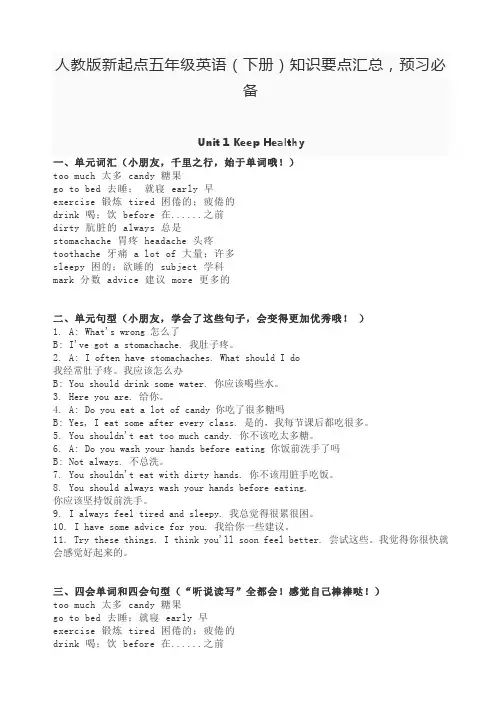
人教版新起点五年级英语(下册)知识要点汇总,预习必备Unit 1 Keep Healthy一、单元词汇(小朋友,千里之行,始于单词哦!)too much 太多 candy 糖果go to bed 去睡;就寝 early 早exercise 锻炼 tired 困倦的;疲倦的drink 喝;饮 before 在......之前dirty 肮脏的 always 总是stomachache 胃疼 headache 头疼toothache 牙痛 a lot of 大量;许多sleepy 困的;欲睡的 subject 学科mark 分数 advice 建议 more 更多的二、单元句型(小朋友,学会了这些句子,会变得更加优秀哦!)1. A: What's wrong 怎么了B: I've got a stomachache. 我肚子疼。
2. A: I often have stomachaches. What should I do我经常肚子疼。
我应该怎么办B: You should drink some water. 你应该喝些水。
3. Here you are. 给你。
4. A: Do you eat a lot of candy 你吃了很多糖吗B: Yes, I eat some after every class. 是的,我每节课后都吃很多。
5. You shouldn't eat too much candy. 你不该吃太多糖。
6. A: Do you wash your hands before eating 你饭前洗手了吗B: Not always. 不总洗。
7. You shouldn't eat with dirty hands. 你不该用脏手吃饭。
8. You should always wash your hands before eating.你应该坚持饭前洗手。
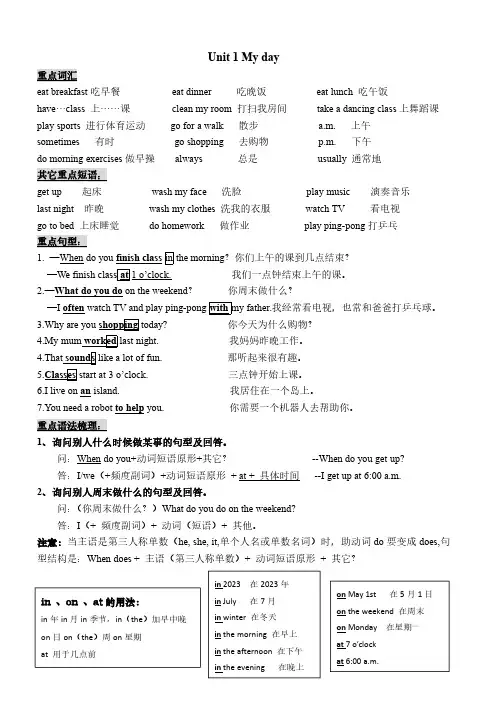
2.询问某人生日日期的问句及回答:—When is+形物代/名词所有格+birthday?—It's on+几月几日./形物代/名词所有格+birthday+is on+几月几日.例:—When is your birthday?你的生日是什么时候?—My birthday is on April4th.我的生日是4月4日。
3.①基数词用来表示人或物的数量,后面常跟复数名词(one除外):I have two pencils.我有两支铅笔。
②序数词用来表示顺序先后:Our classroom is on the second floor.我们的教室在二楼4.基数词变序数词的变化规则:(1)一般情况,在基数词后直接+th。
seven-seventh;thirteen-thirteenth;four-fourth(2)一、二、三,特殊记one-first;two-second;three-third(3)九去e,ve要用f替nine-ninth;five-fifth;twelve-twelfth(4)以-ty结尾时,边y为i再加-th。
twenty-twentieth;thirty-thirtieth(3)表示几十几,变个位即可。
twenty-two→twenty-second;thirty-five→thirty-fifthUnit5Whose dog is it?重点词汇:her她的playing(正在)玩耍yours你(们)的his他的jumping(正在)跳theirs他/她/她们的mine我的eating(正在)吃excited兴奋的;激动的ours我们的climbing(正在)攀爬like像.....那样its它的drinking(正在)喝sleeping(正在)睡觉重点短语:a beautiful painting一幅美丽的画look at看in the kitchen在厨房a picture of Shanghai一幅上海的图each other相互listen to music听音乐take him to the park把他带到公园come here过来play with him和他一起玩耍swim like a fish像鱼一样游泳of course当然run so fast跑得这么快dance like a bear像熊一样跳舞take pictures拍照so cute这么可爱run like a tiger像老虎一样跑drink water喝水walk like an elephant像大象一样走路重点句型1.The yellow picture is mine.这幅黄颜色的画是我的。
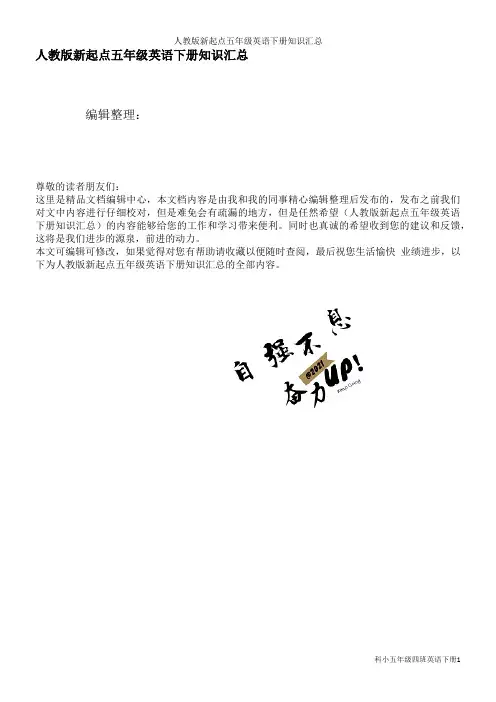
人教版新起点五年级英语下册知识汇总人教版新起点五年级英语下册知识汇总编辑整理:尊敬的读者朋友们:这里是精品文档编辑中心,本文档内容是由我和我的同事精心编辑整理后发布的,发布之前我们对文中内容进行仔细校对,但是难免会有疏漏的地方,但是任然希望(人教版新起点五年级英语下册知识汇总)的内容能够给您的工作和学习带来便利。
同时也真诚的希望收到您的建议和反馈,这将是我们进步的源泉,前进的动力。
本文可编辑可修改,如果觉得对您有帮助请收藏以便随时查阅,最后祝您生活愉快业绩进步,以下为人教版新起点五年级英语下册知识汇总的全部内容。
人教版新起点五年级英语下册知识汇总人教版新起点五年级英语(下册)知识要点汇总,预习必备Unit 1 Keep Healthy一、单元词汇(小朋友,千里之行,始于单词哦!)too much 太多 candy 糖果go to bed 去睡;就寝 early 早exercise 锻炼 tired 困倦的;疲倦的drink 喝;饮 before 在。
...。
之前dirty 肮脏的 always 总是stomachache 胃疼 headache 头疼toothache 牙痛 a lot of 大量;许多sleepy 困的;欲睡的 subject 学科mark 分数 advice 建议 more 更多的二、单元句型(小朋友,学会了这些句子,会变得更加优秀哦!)1。
A:What’s wrong? 怎么了?B: I’ve got a stomachache。
我肚子疼。
2。
A: I often have stomachaches. What should I do?我经常肚子疼。
我应该怎么办?B: You should drink some water. 你应该喝些水.3. Here you are。
给你.4。
A: Do you eat a lot of candy?你吃了很多糖吗?B: Yes, I eat some after every class。
![人教版新起点五年级英语下册知识汇总[1]](https://uimg.taocdn.com/08129c09856a561253d36f10.webp)
人教版新起点五年级英语下册知识汇总(word版可编辑修改)编辑整理:尊敬的读者朋友们:这里是精品文档编辑中心,本文档内容是由我和我的同事精心编辑整理后发布的,发布之前我们对文中内容进行仔细校对,但是难免会有疏漏的地方,但是任然希望(人教版新起点五年级英语下册知识汇总(word版可编辑修改))的内容能够给您的工作和学习带来便利。
同时也真诚的希望收到您的建议和反馈,这将是我们进步的源泉,前进的动力。
本文可编辑可修改,如果觉得对您有帮助请收藏以便随时查阅,最后祝您生活愉快业绩进步,以下为人教版新起点五年级英语下册知识汇总(word版可编辑修改)的全部内容。
人教版新起点五年级英语(下册)知识要点汇总,预习必备Unit 1 Keep Healthy一、单元词汇(小朋友,千里之行,始于单词哦!)too much 太多 candy 糖果go to bed 去睡; 就寝 early 早exercise 锻炼 tired 困倦的;疲倦的drink 喝;饮 before 在..。
.。
之前dirty 肮脏的 always 总是stomachache 胃疼 headache 头疼toothache 牙痛 a lot of 大量;许多sleepy 困的;欲睡的 subject 学科mark 分数 advice 建议 more 更多的二、单元句型(小朋友,学会了这些句子,会变得更加优秀哦! )1。
A: What's wrong? 怎么了?B: I've got a stomachache. 我肚子疼。
2. A: I often have stomachaches. What should I do?我经常肚子疼。
我应该怎么办?B: You should drink some water. 你应该喝些水。
3。
Here you are。
给你。
4。
A: Do you eat a lot of candy? 你吃了很多糖吗?B: Yes, I eat some after every class。
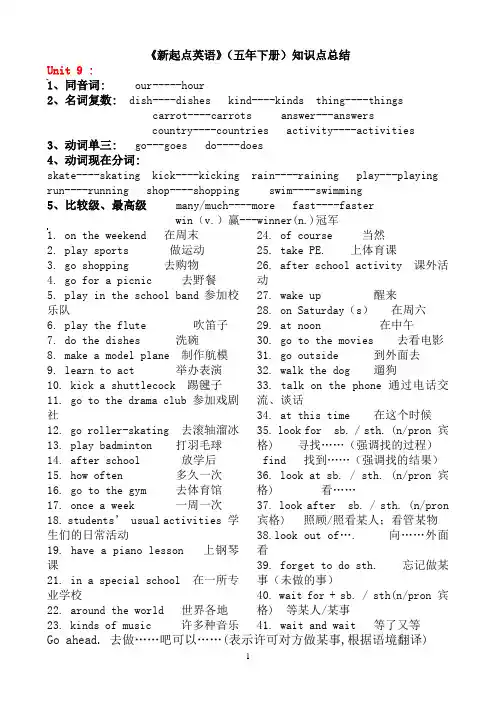
《新起点英语》(五年下册)知识点总结Unit 9 :1、同音词: our-----hour2、名词复数: dish----dishes kind----kinds thing----thingscarrot----carrots answer---answerscountry----countries activity----activities3、动词单三: go---goes do----does4、动词现在分词:skate----skating kick----kicking rain----raining play---playing run----running shop----shopping swim----swimming5、比较级、最高级 many/much----more fast----fasterwin(v.)赢---winner(n.)冠军1. on the weekend 在周末2. play sports 做运动3. go shopping 去购物4. go for a picnic 去野餐5. play in the school band参加校乐队6. play the flute 吹笛子7. do the dishes 洗碗8. make a model plane 制作航模9. learn to act 举办表演10. kick a shuttlecock 踢毽子11. go to the drama club 参加戏剧社12. go roller-skating 去滚轴溜冰13. play badminton 打羽毛球14. after school 放学后15. how often 多久一次16. go to the gym 去体育馆17. once a week 一周一次18. students’ usual activities 学生们的日常活动19. have a piano lesson 上钢琴课21. in a special school 在一所专业学校22. around the world 世界各地23. kinds of music 许多种音乐24. of course 当然25. take PE. 上体育课26. after school activity 课外活动27. wake up 醒来28. on Saturday(s)在周六29. at noon 在中午30. go to the movies 去看电影31. go outside 到外面去32. walk the dog 遛狗33. talk on the phone 通过电话交流、谈话34. at this time 在这个时候35. look for sb. / sth. (n/pron 宾格) 寻找……(强调找的过程)find 找到……(强调找的结果)36. look at sb. / sth. (n/pron 宾格) 看……37. look after sb. / sth. (n/pron 宾格) 照顾/照看某人;看管某物38.look out of…. 向……外面看39. forget to do sth. 忘记做某事(未做的事)40. wait for + sb. / sth(n/pron 宾格) 等某人/某事41. wait and wait 等了又等Go ahead. 去做……吧可以……(表示许可对方做某事,根据语境翻译)May I draw a picture here? Go ahead.(去画吧。
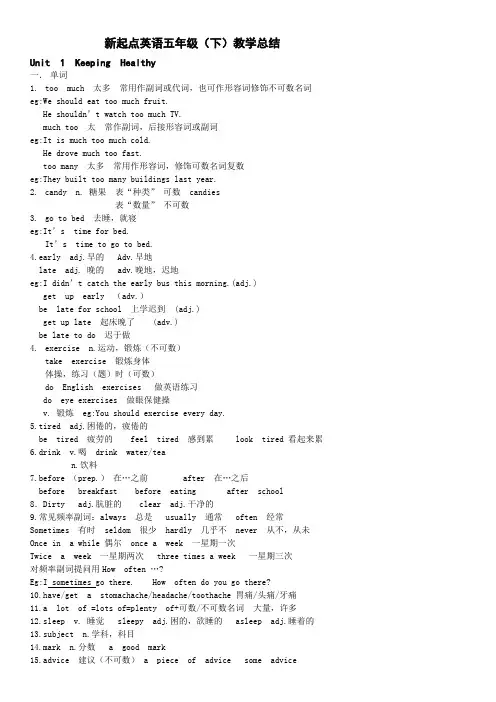
新起点英语五年级(下)教学总结Unit 1 Keeping Healthy一.单词1.too much 太多常用作副词或代词,也可作形容词修饰不可数名词eg:We should eat too much fruit.He shouldn’t watch too much TV.much too 太常作副词,后接形容词或副词eg:It is much too much cold.He drove much too fast.too many 太多常用作形容词,修饰可数名词复数eg:They built too many buildings last year.2.candy n. 糖果表“种类”可数 candies表“数量”不可数3.go to bed 去睡,就寝eg:It’s time for bed.It’s time to go to bed.4.early adj.早的 Adv.早地late adj. 晚的 adv.晚地,迟地eg:I didn’t catch the early bus this morning.(adj.)get up early (adv.)be late for school 上学迟到 (adj.)get up late 起床晚了 (adv.)be late to do 迟于做4.exercise n.运动,锻炼(不可数)take exercise 锻炼身体体操,练习(题)时(可数)do English exercises 做英语练习do eye exercises 做眼保健操v. 锻炼 eg:You should exercise every day.5.tired adj.困倦的,疲倦的be tired 疲劳的 feel tired 感到累 look tired 看起来累6.drink v.喝 drink water/tean.饮料7.before (prep.)在…之前 after 在…之后before breakfast before eating after school 8.Dirty adj.肮脏的 clear adj.干净的9.常见频率副词:always 总是 usually 通常 often 经常Sometimes 有时 seldom 很少 hardly 几乎不 never 从不,从未Once in a while 偶尔 once a week 一星期一次Twice a week 一星期两次 three times a week 一星期三次对频率副词提问用How often …?Eg:I sometimes go there. How often do you go there?10.have/get a stomachache/headache/toothache 胃痛/头痛/牙痛11.a lot of =lots of=plenty of+可数/不可数名词大量,许多12.sleep v. 睡觉 sleepy adj.困的,欲睡的 asleep adj.睡着的13.subject n.学科,科目14.mark n.分数 a good mark15.advice 建议(不可数) a piece of advice some advice16.more adj.(many,much的比较级)更多的,较多的Eg:More and more people are going in for sports.most adj.(many,much的最高级)最多的,最大的Eg:She has the most books in the class.17.health n. 健康 healthy adj.健康的 healthily adv.健康地keep/be/stay healthy=keep/be/stay in good health 保持健康healthy diet 均衡饮食,健康饮食healthy food 健康食品 junk food 垃圾食品二.语法情态动词:本身有一定词义,但不完整,不能独立做谓语,只能和实意动词(原型)一起构成谓语,表示说话人的态度,一般无人称和数的变化。
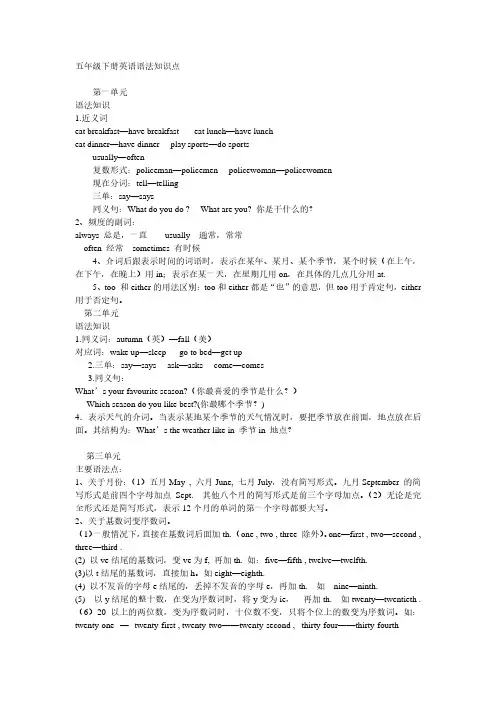
五年级下册英语语法知识点第一单元语法知识1.近义词eat breakfast—have breakfast eat lunch—have luncheat dinner—have dinner play sports—do sportsusually—often复数形式:policeman—policemen policewoman—policewomen现在分词:tell—telling三单:say—says同义句:What do you do ? ---What are you? 你是干什么的?2、频度的副词:always 总是,一直usually通常,常常often 经常sometimes 有时候4、介词后跟表示时间的词语时,表示在某年、某月、某个季节,某个时候(在上午,在下午,在晚上)用in;表示在某一天,在星期几用on,在具体的几点几分用at.5、too 和either的用法区别:too和either都是“也”的意思,但too用于肯定句,either 用于否定句。
第二单元语法知识1.同义词:autumn(英)—fall(美)对应词:wake up—sleep go to bed—get up2.三单:say—says ask—asks come—comes3.同义句:What’s your favourite season?(你最喜爱的季节是什么?)----Which season do you like best?(你最哪个季节?)4.表示天气的介词。
当表示某地某个季节的天气情况时,要把季节放在前面,地点放在后面。
其结构为:What’s the weather like in 季节in 地点?第三单元主要语法点:1、关于月份:(1)五月May , 六月June, 七月July,没有简写形式。
九月September 的简写形式是前四个字母加点Sept.其他八个月的简写形式是前三个字母加点。
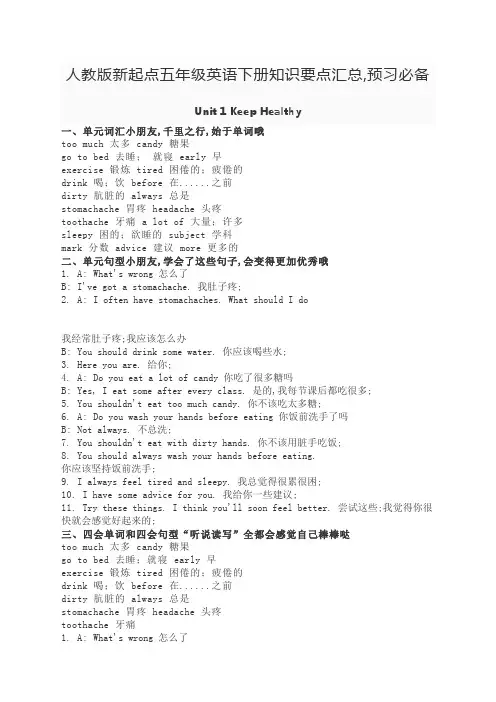
人教版新起点五年级英语下册知识要点汇总,预习必备Unit 1 Keep Healthy一、单元词汇小朋友,千里之行,始于单词哦too much 太多 candy 糖果go to bed 去睡;就寝 early 早exercise 锻炼 tired 困倦的;疲倦的drink 喝;饮 before 在......之前dirty 肮脏的 always 总是stomachache 胃疼 headache 头疼toothache 牙痛 a lot of 大量;许多sleepy 困的;欲睡的 subject 学科mark 分数 advice 建议 more 更多的二、单元句型小朋友,学会了这些句子,会变得更加优秀哦1. A: What's wrong 怎么了B: I've got a stomachache. 我肚子疼;2. A: I often have stomachaches. What should I do我经常肚子疼;我应该怎么办B: You should drink some water. 你应该喝些水;3. Here you are. 给你;4. A: Do you eat a lot of candy 你吃了很多糖吗B: Yes, I eat some after every class. 是的,我每节课后都吃很多;5. You shouldn't eat too much candy. 你不该吃太多糖;6. A: Do you wash your hands before eating 你饭前洗手了吗B: Not always. 不总洗;7. You shouldn't eat with dirty hands. 你不该用脏手吃饭;8. You should always wash your hands before eating.你应该坚持饭前洗手;9. I always feel tired and sleepy. 我总觉得很累很困;10. I have some advice for you. 我给你一些建议;11. Try these things. I think you'll soon feel better. 尝试这些;我觉得你很快就会感觉好起来的;三、四会单词和四会句型“听说读写”全都会感觉自己棒棒哒too much 太多 candy 糖果go to bed 去睡;就寝 early 早exercise 锻炼 tired 困倦的;疲倦的drink 喝;饮 before 在......之前dirty 肮脏的 always 总是stomachache 胃疼 headache 头疼toothache 牙痛1. A: What's wrong 怎么了B: I've got a stomachache. 我肚子疼;2. A: I often have stomachaches. What should I do我经常肚子疼;我应该怎么办B: You should drink some water. 你应该喝些水;3. You shouldn't eat too much candy. 你不该吃太多糖;四、重点音标从今天起, 做一个发音标准的英语侠ea /e/ head bread sweater weather healthy heavyea /i:/ speak meat tea cleanUnit 2 Special Days一、单元词汇小朋友,千里之行,始于单词哦New Year's Day 新年Tree Planting Day 植树节Mother's Day 母亲节 Children's Day 儿童节Father's Day 父亲节Teacher's Day 教师节National Day 国庆节Christmas Day 圣诞节birthday 生日 fifth5th 第五 tenth 第十twelfth 第十二 twenty-fifth 第二十五plant 种植 make a poster 制作海报celebrate 庆祝 have a picnic 野餐office 办公室 together 在一起 special 特别的二、单元句型小朋友,学会了这些句子,会变得更加优秀哦1. A: When is Tree Planting Day 植树节是什么时候B: It's on March 12th. 是3月12日;2. A: What do you do on that day 你那天做什么B: We often plant trees. 我们经常种树;3. A: What are you doing 你在做什么B: I am going to make a poster for Tree Planting Day.我要给植树节做一个海报;4. A: How are you going to celebrate it 你怎么庆祝它B: Before Tree Planting Day, we are going to read some books about trees. 在植树节前,我们要读一些和树相关的书;B: Then we are going to make a poster about trees.然后我们要做一张和树相关的海报;B: On Tree Planting Day, we are going to plant trees with our classmates. 在植树节,我们要和同学植树;B: After that, we are going to climb a hill and fly our kites. 在那之后,我们要爬山和放风筝;B: We are also going to have a picnic together. 我们要一起野餐;5. That sounds great. 哇;听起来不错;6. On Teachers' Day, children say "thank you" to their teachers. 教师节,孩子们对他们的老师道谢;7. Children can thank their fathers on Father's Day.孩子们在父亲节感谢他们的爸爸;8. Children can show their love to their mothers on Mother's Day.孩子们能在母亲节向妈妈示爱;9. They can make breakfast for them, or help them do chores.他们能给她们做早饭,或者帮她们做家务;10. Christmas is a special day in Western countries for all the family. 圣诞节对于西方国家和所有家庭来说都是特殊的一天;11. People give presents to their friends and family. 人们给朋友和家人送礼;12. Many people put Christmas trees in their homes, too.许多人还把圣诞树放在家里;三、四会单词和四会句型“听说读写”全都会感觉自己棒棒哒New Year's Day 新年Tree Planting Day 植树节Mother's Day 母亲节 Children's Day 儿童节Father's Day 父亲节Teacher's Day 教师节National Day 国庆节Christmas Day 圣诞节birthday 生日 fifth5th 第五 tenth 第十 twelfth第十二 twenty-fifth 第二十五 plant 种植make a poster 制作海报celebrate 庆祝 have a picnic 野餐1. A: When is Tree Planting Day 植树节是什么时候B: It's on March 12th. 是3月12日;2. A: What do you do on that day 你那天做什么B: We often plant trees. 我们经常种树;3. A: What are you doing 你在做什么B: I am going to make a poster for Tree Planting Day.我要给植树节做一个海报;4. A: How are you going to celebrate it 你怎么庆祝它B: On Tree Planting Day, we are going to plant trees with our classmates. 在植树节,我们要和同学植树;四、重点音标从今天起, 做一个发音标准的英语侠tr /tr/ try trick tree traveltr /dr/ dry drink dress driveUnit 3 Making Contact一、单元词汇小朋友,千里之行,始于单词哦send an email 发电子邮件write a letter 写信make a phone call 打电话send a short message 发送短消息mail a present 邮寄礼物make a video call 打视频电话say 说;讲make a card 制作卡片everywhere 到处 flower show 花展二、单元句型小朋友,学会了这些句子,会变得更加优秀哦1. A: What do you want to do on New Year's Day你新年想做什么B: I want to write a letter to my father. 我想给爸爸写一封信;2. It's Mother's Day tomorrow. 明天是母亲节;3. A: What would you like to do 你想做什么B: I would like to say "I love you" to my mother.我想和妈妈说“我爱你”;4. Well, you can make a card for your mother.好,你可以给你妈妈做一张卡片;5. You can write "I love you" on the card.你可以在卡片上写“我爱你”;6. That's a great idea. 听起来不错;7. I'd like to do that. 我喜欢做那些;8. I would like to go to Xin Yuan Park with my parents.我想和父母一起去心愿公园;9. Would you like to go with us 你想和我们一起去吗三、四会单词和四会句型“听说读写”全都会感觉自己棒棒哒send an email 发电子邮件write a letter 写信make a phone call 打电话send a short message 发送短消息mail a present 邮寄礼物make a video call 打视频电话say 说;讲make a card 制作卡片1. A: What do you want to do on New Year's Day你新年想做什么B: I want to write a letter to my father. 我想给爸爸写一封信;2. A: What would you like to do 你想做什么B: I would like to say "I love you" to my mother.我想和妈妈说“我爱你”;四、重点音标从今天起, 做一个发音标准的英语侠ight /at/ night light rightigh /a/ high sigh thighUnit 4 Last Weekend一、单元词汇小朋友,千里之行,始于单词哦Cleaned the window 过去式擦窗子watched TV 过去式看电视climbed a hill 过去式爬山visited grandparents 过去式看望祖父母danceddance的过去式跳舞jumped rope 过去式跳绳listened to music 过去式听音乐rowed a boat 过去式划船played computer games 过去式玩电子游戏stayed at home 过去式呆在家里played the piano 过去式弹钢琴played chess 过去式下棋washed clothes 过去式洗衣服boring 乏味的badminton 羽毛球won win的过去式赢;获胜二、单元句型小朋友,学会了这些句子,会变得更加优秀哦1. A: What did you do last weekend 你上周末做了什么B: I visited my grandparents. 我去拜访了祖父母;2. A: How was your weekend 你周末过得怎么样B: It was wonderful. 很棒;3. A: What did you do last weekend 你上周末做什么了B: I watched a football match with my friends, and then we played football together. 我和朋友看了足球赛,然后一起踢足球了;B: On Sunday, I played the violin in a music club. 周日,我在音乐社拉小提琴了;A: That really sounds fun. 听起来很有趣;4. A: How was your weekend 你的周末怎么样B: It was great on Saturday. 周六很棒;B: It was rainy in the afternoon. 下午在下雨;B: I played in the rain. It was a lot of fun. 我在雨中玩;很有趣;A: Wow, that was cool. 哇,那很酷;5. A: What did you do last Sunday 你上周日做了什么B: I stayed in bed all day. I was ill. 我一直呆在床上;我病了;A: Oh, what a pity I'm sorry to hear that.哦,太遗憾了我很抱歉听到这个消息;三、四会单词和四会句型“听说读写”全都会感觉自己棒棒哒Cleaned the window 过去式擦窗子watched TV 过去式看电视climbed a hill 过去式爬山visited grandparents 过去式看望祖父母danceddance的过去式跳舞jumped rope 过去式跳绳listened to music 过去式听音乐rowed a boat 过去式划船played computer games 过去式玩电子游戏stayed at home 过去式呆在家里played the piano 过去式弹钢琴played chess 过去式下棋washed clothes 过去式洗衣服boring 乏味的1. A: How was your weekend 你周末过得怎么样B: It was wonderful. 很棒;2. A: What did you do last weekend 你上周末做什么了B: I watched a football match with my friends, and then we played football together. 我和朋友看了足球赛,然后一起踢足球了;四、语音知识从今天起, 做一个发音标准的英语侠动词过去式字母组合ed的发音规则:在清辅音后的发音为/t/,如:helped, asked在浊辅音和元音后的发音为/d/,如:stayed,learned在t, d后的发音为/d/,如: wanted, needed五、语法知识一般过去时1. 含义:过去某个时间里发生的动作或状态;过去习惯性、经常性的动作或行为;过去主语所具备的能力和性格;2. 时间标志词:yesterday, last week...3. 结构:1陈述句肯定形式:主语 + 动词过去式 + 其他.否定形式:主语 + didn't + 动词原形 + 其他.2一般疑问句①Did + 主语 + 动词原形 + 其它②Was/Were + 主语 + 表语3特殊疑问句疑问词 + did + 主语 + 动词原形 + 其他4. 变化规则:1规则变化①动词 + ed;②不发音e结尾的单词,只加d;2不规则变化:①A-A型原形和过去式同形:如:let, put, read, cut, cost②A-B型原形和过去式不同:如:come-came, run-ranUnit 5 Have a Great Trip一、单元词汇小朋友,千里之行,始于单词哦went to the beach 过去式去海边drank cold drinks 过去式喝冷饮swam swim的过去式游泳ate ice-cream 过去式吃冰淇淋the Stone Forest 石林bought some gifts 过去式买礼物took photos 过去式拍照片saw flowers 过去式赏花slept sleep的过去式睡觉delicious 美味的felt happy 过去式觉得高兴sad 悲哀的 left leave过去式离开French fries 法式炸薯条were are的过去式是二、单元句型小朋友,学会了这些句子,会变得更加优秀哦1. A: How was your summer vacation 你暑假过的怎么样B: It was fun. 很有趣;2. A: Where did you go 你去了哪B: I went to Beijing with my parents. 我和父母一起去北京了;3. A: What did you do there 你在那里做了什么B: We went to Beijing Zoo and saw many lovely animals there. 我们去了北京动物园,看了很多可爱的动物;4. We took lots of photos in Tian'anmen Square. 我们在天安门广场照了很多照片;5. We also ate Beijing duck. It was delicious 我们还吃了很多北京烤鸭;很美味6. We went to the Summer Palace. 我们去了颐和园;7. I rowed a boat on Kunming Lake. 我们在昆明湖划船了;8. I felt very happy. 我觉得很开心;9. That sounds like a great trip. 听起来是场很棒的旅行;三、四会单词和四会句型“听说读写”全都会感觉自己棒棒哒went to the beach 过去式去海边drank cold drinks 过去式喝冷饮swam swim的过去式游泳ate ice-cream 过去式吃冰淇淋the Stone Forest 石林bought some gifts 过去式买礼物took photos 过去式拍照片saw flowers 过去式赏花slept sleep的过去式睡觉delicious 美味的felt happy 过去式觉得高兴1. A: How was your summer vacation 你暑假过的怎么样B: It was fun. 很有趣;2. A: Where did you go 你去了哪B: I went to Beijing with my parents. 我和父母一起去北京了;3. A: What did you do there 你在那里做了什么B: We went to Beijing Zoo and saw many lovely animals there. 我们去了北京动物园,看了很多可爱的动物;四、重点音标从今天起, 做一个发音标准的英语侠le /l/ apple maple bottle turtle table bubbleUnit 6 Growing Up一、单元词汇小朋友,千里之行,始于单词哦was born 出生started to speak 过去式开始说话learned to walk 过去式学走路learned to ride a bike 过去式学骑自行车went to kindergarten 过去式上幼儿园went to school 过去式上学learned to swim 过去式学游泳fifteenth15th 第十五started to buy things 过去式开始学买东西started to study English 过去式开始学英语started to use a computer 过去式开始使用电脑all over 到处out of 离开某处into 进入chopsticks 筷子wet 湿的二、单元句型小朋友,学会了这些句子,会变得更加优秀哦1. A: Tell us one of your growing-up stories and talk about your photos. 告诉我们你的成长故事之一,谈谈你的照片吧;B: I was born on May 15th, 2004. 我出生于2004年5月15日;B: I started to speak when I was ten months old.我十个月时开始说话的;2. A: When did you start to use a computer你什么时候开始用电脑的B: When I was four. What about you 四岁;你呢I started when I was six. 我六岁开始的;3. A: When did you start to buy things 你什么时候开始买东西的B: When I was five. I bought an ice-cream.在我五岁的时候,我买了一个冰淇淋;4. A: What did you learn to do when you were five你五岁的时候在学什么B: When I was five, I learned to swim and started to study English.我五岁的时候,开始学游泳和英语;5. A: When did you go to kindergarten 你什么时候去的幼儿园B: Oh, I went to kindergarten when I was three.哦,我三岁去的幼儿园;A: Me too. 我也是;三、四会单词和四会句型“听说读写”全都会感觉自己棒棒哒was born 出生started to speak 过去式开始说话learned to walk 过去式学走路learned to ride a bike 过去式学骑自行车went to kindergarten 过去式上幼儿园went to school 过去式上学learned to swim 过去式学游泳fifteenth15th 第十五started to buy things 过去式开始学买东西started to study English 过去式开始学英语started to use a computer 过去式开始使用电脑1. A: When did you start to use a computer你什么时候开始用电脑的B: When I was four. What about you 四岁;你呢I started when I was six. 我六岁开始的;四、语音知识从今天起, 做一个发音标准的英语侠1. 在同一个重读音节或次重读音节内, 清辅音/p/前的音是/s/, 且清辅音/p/后还有元音时,sp组合中p的发音是/b/;如:sports spring speak2. 在同一个重读音节或次重读音节内, 清辅音/k/前的音是/s/, 且清辅音/k/后还有元音时,sk组合中k的发音是/g/;如:skate ski skirt。
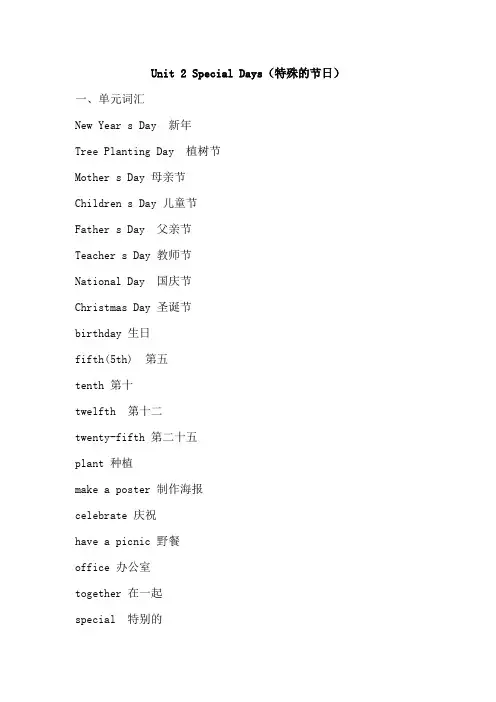
Unit 2 Special Days(特殊的节日)一、单元词汇New Year s Day 新年Tree Planting Day 植树节Mother s Day 母亲节Children s Day 儿童节Father s Day 父亲节Teacher s Day 教师节National Day 国庆节Christmas Day 圣诞节birthday 生日fifth(5th) 第五tenth 第十twelfth 第十二twenty-fifth 第二十五plant 种植make a poster 制作海报celebrate 庆祝have a picnic 野餐office 办公室together 在一起special 特别的二、单元句型1. A: When is Tree Planting Day? 植树节是什么时候?B: It s on March 12th. 是3月12日。
2. A: What do you do on that day? 你那天做什么?B: We often plant trees. 我们经常种树。
3. A: What are you doing? 你在做什么?B: I am going to make a poster for Tree Planting Day.我要给植树节做一个海报。
4. A: How are you going to celebrate it? 你怎么庆祝它?B: Before Tree Planting Day, we are going to read some books about trees. 在植树节前,我们要读一些和树相关的书。
B: Then we are going to make a poster about trees.然后我们要做一张和树相关的海报。
B: On Tree Planting Day, we are going to plant trees with our classmates. 在植树节,我们要和同学植树。
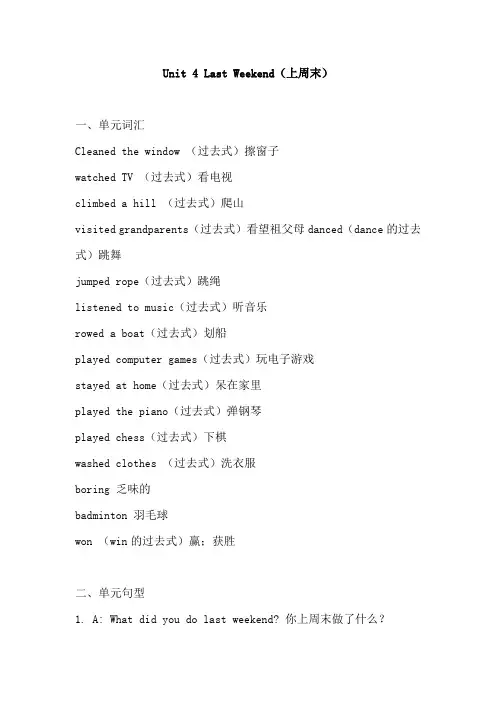
Unit 4 Last Weekend(上周末)一、单元词汇Cleaned the window (过去式)擦窗子watched TV (过去式)看电视climbed a hill (过去式)爬山visited grandparents(过去式)看望祖父母danced(dance的过去式)跳舞jumped rope(过去式)跳绳listened to music(过去式)听音乐rowed a boat(过去式)划船played computer games(过去式)玩电子游戏stayed at home(过去式)呆在家里played the piano(过去式)弹钢琴played chess(过去式)下棋washed clothes (过去式)洗衣服boring 乏味的badminton 羽毛球won (win的过去式)赢;获胜二、单元句型1. A: What did you do last weekend? 你上周末做了什么?B: I visited my grandparents. 我去拜访了祖父母。
2. A: How was your weekend? 你周末过得怎么样?B: It was wonderful. 很棒。
3. A: What did you do last weekend? 你上周末做什么了?B: I watched a football match with my friends, and then we played football together. 我和朋友看了足球赛,然后一起踢足球了。
B: On Sunday, I played the violin in a music club. 周日,我在音乐社拉小提琴了。
A: That really sounds fun. 听起来很有趣。
4. A: How was your weekend? 你的周末怎么样?B: It was great on Saturday. 周六很棒。
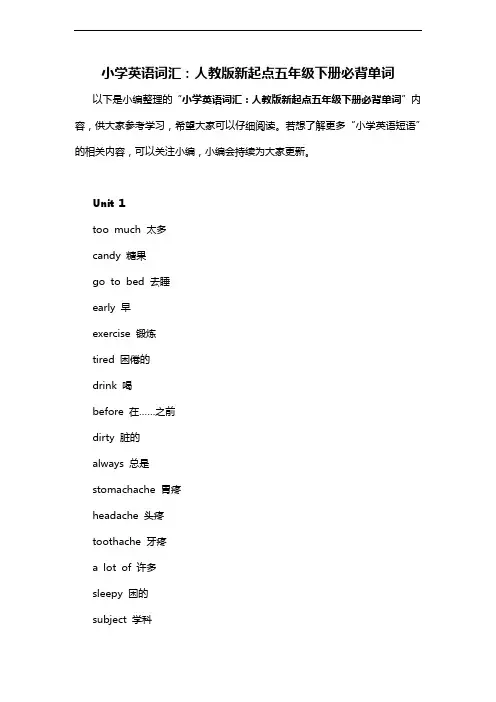
小学英语词汇:人教版新起点五年级下册必背单词以下是小编整理的“小学英语词汇:人教版新起点五年级下册必背单词”内容,供大家参考学习,希望大家可以仔细阅读。
若想了解更多“小学英语短语”的相关内容,可以关注小编,小编会持续为大家更新。
Unit 1too much 太多candy 糖果go to bed 去睡early 早exercise 锻炼tired 困倦的drink 喝before 在……之前dirty 脏的always 总是stomachache 胃疼headache 头疼toothache 牙疼a lot of 许多sleepy 困的subject 学科New Year's Day 新年Tree Planting Day 植树节Mother's Day 母亲节Children's Day 儿童节Father's Day 父亲节Teacher's Day 教师节National Day 国庆节Christmas Day 圣诞节birthday 生日fifth(5th)第五tenth 第十twelfth 第十二twenty-fifth 第二十五plant 种植make a poster 制作海报celebrate 庆祝have a picnic 野餐office 办公室together 在一起special 特别的send an email 发电子邮件write a letter 写信make a phone call 打电话send a short message 发送短消息mail a present 邮寄礼物make a video call 打视频电话say 说;讲make a card 制作卡片everywhere 到处flower show 花展Unit 4cleaned the window (过去式)擦窗子watched TV (过去式)看电视climbed a hill (过去式)爬山visited grandparents (过去式)看望祖父母danced (dance的过去式)跳舞jumped rope (过去式)跳绳listened to music (过去式)听音乐rowed a boat (过去式)划船played computer games (过去式)玩电子游戏stayed at home (过去式)呆在家里played the piano (过去式)弹钢琴played chess (过去式)下棋washed clothes (过去式)洗衣服boring 乏味的badminton 羽毛球won (win的过去式)赢;获胜Unit 5went to the beach (过去式)去海边drank cold drinks (过去式)喝冷饮swam (swim的过去式)游泳ate ice-cream (过去式)吃冰淇淋the Stone Forest 石林bought some gifts (过去式)买礼物took photos (过去式)拍照片saw flowers (过去式)赏花slept (sleep的过去式)睡觉delicious 美味的felt happy (过去式)觉得高兴sad 悲哀的left (leave过去式)离开French fries 法式炸薯条were (are的过去式)是Unit 6was born 出生started to speak (过去式)开始说话learned to walk (过去式)学走路learned to ride a bike (过去式)学骑自行车went to kindergarten (过去式)上幼儿园went to school (过去式)上学learned to swim (过去式)学游泳fifteenth(15th) 第十五started to buy things (过去式)开始学买东西started to study English (过去式)开始学英语started to use a computer (过去式)开始使用电脑all over 到处out of 离开(某处)into 进入chopsticks 筷子wet 湿的。
Unit 3 Making Contact 知识总结一、单元词汇send an email 发电子邮件write a letter 写信make a phone call 打电话send a short message 发送短消息mail a present 邮寄礼物make a video call 打视频电话say 说;讲make a card 制作卡片everywhere 到处flower show 花展二、单元句型1. A: What do you want to do on New Year s Day?你新年想做什么?B: I want to write a letter to my father. 我想给爸爸写一封信。
2. It s Mother s Day tomorrow. 明天是母亲节。
3. A: What would you like to do? 你想做什么?B: I would like to say "I love you" to my mother.我想和妈妈说“我爱你”。
4. Well, you can make a card for your mother.好,你可以给你妈妈做一张卡片。
5. You can write "I love you" on the card.你可以在卡片上写“我爱你”。
6. That s a great idea. 听起来不错。
7. I d like to do that. 我喜欢做那些。
8. I would like to go to Xin Yuan Park with my parents.我想和父母一起去心愿公园。
9. Would you like to go with us? 你想和我们一起去吗?三、四会单词和四会句型send an email 发电子邮件write a letter 写信make a phone call 打电话send a short message 发送短消息mail a present 邮寄礼物make a video call 打视频电话say 说;讲make a card 制作卡片1. A: What do you want to do on New Year s Day?你新年想做什么?B: I want to write a letter to my father. 我想给爸爸写一封信。
新起点五年级Unit1 知识汇总一、词汇too much太多 candy糖果 go to bed去睡;就寝early早dirty肮脏的exercise锻炼 tired 困倦的;疲倦的drink喝;饮 before 在......之前always 总是 stomachache 胃疼 headache 头疼 subject学科a lot of大量,许多 sleepy困的;欲睡的 mark分数 advice建议more 更多的drink milk 喝牛奶every day每天wash hands洗手do homework 做家庭作业brush teeth刷牙play on computer 玩电脑last night 昨晚have got a stomachache/ toothache/ headache 胃痛/牙痛/头痛turn off关turn on 开many kinds of 许多种类 a little 少许,一些+una few 少许,一些+cn(复数) many+cn(复数) 很多much+un 许多A lot of +cn(复数)/un 许多,大量= plenty of such as 例如some+cn(复数)/un 一些(肯定句中)any+cn(复数)/un 一些(否,疑问句中)healthy 健康的unhealthy不健康的energy能量by the sea在海边wish 愿望choose选择carefully谨慎地thank you for 谢谢你...二、句子1. Please do your homework.2. You should exercise every day and go to bed early.3. We shouldn’t eat too much candy.4. We should eat a lot of fruit.5. -- What’s wrong with you ? -- I’ve got a stomachache.6. -- What should I do? -- You should drink some water.7. Here you are. 8. You shouldn’t eat too much candy.9. -- Do you wash your hands before eating? -- Not always.10. You shouldn’t eat with dirty hands. 11. I have some advice for you.12. We should eat plenty of fruit and vegetables.13. I wish for good health.三、句型结构1. -- What’s wrong with you?= What’s the matter with you?-- I’ve got a/ an + 疾病名称.eg: -- What’s wrong? -- I’ve got a fever.--what’s the matter? --I've got a toothache.2.--What should +主语+do?--主语+ should/ shouldn’t + 动词原形(+其他).eg: You should keep quiet in hospital. You shouldn’t eat too much meat.You shouldn’t play too much on the computer or watch too much TV.You should go to bed before 9:30.四、自然拼读head bread sweater weather healthy heavy thread人教新起点五年级下册Unit2知识汇总一、词汇New Year’s Day新年 Tree Planting Day植树节Father’s Day父亲节Mother’s Day母亲节 Children’s Day儿童节Teachers’ Day教师节National Day 国庆节 Christmas Day圣诞节 birthday生日 plant种植fifth (5th)第五tenth (10th) 第十 twelfth (12th) 第十二celebrate庆祝twenty-fifth (25th) 第二十五 make a poster 制作海报have a picnic野餐office办公室together 在一起;共同 special 特殊的;特别的do chores 做家务buy flowers for mum 给妈妈买花have a party 办派对climb a hill爬山have fun= have a good time 玩得开心presents礼物work hard 努力工作/学习the Dragon Boat Festival 端午节famous著名的poet诗人Halloween 万圣节dress up 打扮roast turkey 烤火鸡wake up醒来have many things to do 有很多事要做二、句子1. -- When is Tree Planting Day? -- It’s on March 12th.2. -- What do you do on that day? -- We often plant trees.3. -- What day is it today? -- It’s Mother’s Day.4. -- What do you do on that day? -- I often buy flowers for my mum.5. -- What are you going to do?-- I am going to make a poster for Tree Planting Day.6. -- How are you going to celebrate it? -- We are going to read some books about trees. Then we are going to make a poster about trees7.Christmas Day is a special day in Western countries for all the family.8.It is the most important holiday for us.9.On Teachers' Day, children say "thank you" to their teachers.10.Christmas is a special day in Western countries for all the family.三、句型结构1. -- When is + 节日? -- It’s on + 具体日期.eg: -- When is Teachers’ Day? -- It’s on September 1st.--When is Mother’s Day? --It’s on the second Sunday of May.2. -- What do you do on that day?-- I/ We + 频率副词+ 动词(短语)原形(+其他).eg: -- What do you do on that day? -- I often make a card for my teacher.-- What do you do on that day? -- We usually clean the office for our teachers. 3. -- How are you going to celebrate + 节日?-- I’m/ We’re going to + 动词(短语)原形(+其他).eg: -- How are you going to celebrate New Year?-- We’re going to make dumplings.--How are you going to celebrate Children’s Day? --I’m not going to school. I’m going to meet my friends and play games.四、自然拼读drink dress driver drip drop tree train trip try trace人教新起点五年级下册Unit3知识汇总一、词汇send an email 发送电子邮件 write a letter写信 make a phone call 打电话send a short message 发送短消息mail a present 邮寄礼物say 说;讲make a video call 打视频电话make a card 制作卡片 flower show花展everywhere 各处;到处row a boat 划船interesting有趣的have a great day 度过美好的一天write back to 回信二、句子1. -- What do you want to do on New Year’s Day?-- I want to write a letter to my father.2. -- What do you want to do on Mother’s Day?-- I want to send a short message to my mother.3. -- What would you like to do?-- I would like to say “ I love you” to my mother.4. Can you help me?5. That’s a great idea.6. I would like to go to Xin Yuan Park with my parents.7.I played in the rain. It was a lot of fun.8.A: What did you do last Sunday? B: I stayed in bed all day. I was ill.Oh, what a pity! I'm sorry to hear that.三、句型结构1. -- What do you want to do on + 节日?-- I want to + 动词(短语)原形(+其他).eg: -- What do you want to do on Children’s Day?-- I want to play with my friends.2. -- What would you like to do(+其他)?-- I/ We would like to + 动词原形(+其他).eg: -- What would you like to do? -- I want to go to flower show.四、自然拼读night light right flight sigh high sigh fight bright thigh人教新起点五年级Unit4知识汇总一、词汇cleaned the window(过去式)擦窗子watched TV(过去式)看电视climbed a hill(过去式)爬山visited grandparents (过去式)看望祖父母danced(dance过去式)跳舞 jumped rope(过去式)跳绳listened to music(过去式)听音乐 rowed a boat(过去式)划船played computer games(过去式)玩电子游戏 badminton 羽毛球stayed at home(过去式)呆在家里played the piano(过去式)弹钢琴played chess(过去式)下棋 washed clothes(过去式)洗衣服boring 单调的;乏味的 won(win的过去式)赢;获胜二、句子1. -- What did you do last weekend? -- I visited my grandparents.2. -- What did you do last weekend? -- I climbed a hill.3. What about you?4. I washed clothes.5. It was boring.6. -- How was your weekend? -- It was wonderful.7. -- What did you do last weekend? -- I watched a football match with my friends, and then we played football together.8. That was cool. 9. What a pity! 10. I’m sorry to hear that.三、句型结构1. -- How was your weekend? -- It was + 形容词.eg: -- How was your weekend? -- It was boring.2. -- What did you do last weekend? -- I/ We + 动词过去式(+其他). eg: -- What did you do last weekend? -- I played the piano.一般过去时一、概念:表示过去时间里发生的动作或存在的状态,或者过去习惯性、经常性的动作。
新起点五年级下册
Unit 9 How often do you go there? 重点句型:
1.what do you do after school?
I often……
What does he / she do after school?
He / she often ……
2.How often do you……?I ……twice a ……
How often does she / he ……?
She / he……
读熟背诵:
What do you do on the weekend?
你周末做什么?
I often go to my piano lesson.
我经常去上钢琴课。
How often do you go there?
你多久去那一次?
Four times a week.
一周4次。
重点词汇:
go for a picnic
去野餐
go shopping
去购物
do the dishes
洗碗
play the piano
弹钢琴
every day
每天
three times a week
一周3次
twice a week
一周2次
once a week
一周1次
Be good at
擅长做
Unit 10 Doing things
重点句型:
1.What do you have to do in your spare time? I have to ……
2.Can I go to the movies? Sure, you can. But first you have to finish your project. /
Sorry, you can’t. Y ou have to practice the violin.
读熟背诵:
What chores do you have to do at home?
你在家必须做哪些家务?
I have to do the dishes, sweep the floor, take out the garbage and make my bed.
我必须洗碗,擦地,倒垃圾还有铺床。
How often do you do the dishes?
你多久洗一次碗?
Twice a week.
一周2次
Can I watch TV now?
我现在能看电视吗?
Sorry, you can’t. Y ou have to study for the test.
不能,你必须好好学习准备考试。
重点词汇:
Set the table 摆放餐具
Take out the garbage 倒垃圾
Sweep the floor 扫地
Make the bed 铺床
Have to 不得不
A lot of 许多
Do chores 做家务
Look after 照看
Tomorrow 明天
The day after tomorrow 后天
Unit 11 Keeping fit 重点句型:
1.Y ou should / you shouldn’t……
2.What’s wrong?
I have a ……
读熟背诵:
Y ou shouldn’t eat too many hamburgers.
你不能吃太多汉堡。
Y ou should eat a lot of fruit.
你应该多吃水果。
What’s wrong?
怎么了?
I have a stomachache.
我肚子疼。
重点词汇:
Keep fit 保持健康
Stay up late 熬夜
Toothache 牙痛
Junk food 垃圾食品
Take some medicine 吃药
Before 在……之前
Too much 太多
A running nose 流鼻涕
More 更多的
Unit 13 Last weekend
重点句型:
1.What did you do last weekend?
I ……
2. Did you ……last weekend?
Y es, I did./ No, I didn’t.
动词过去式:
(1)一般情况下,动词词尾加ed ,如:
work—worked;play—played;want— wanted;act—acted (2)以不发音的 e 结尾动词,动词词尾加 d,如:
live—lived;move—moved;decide—decided;decline—declined;hope—hoped;
(3)以辅音字母+ y结尾的动词,把y变为i 再加ed,如:studied tried copied justified cried carried embodied emptied (4)以一个辅音字母结尾的重读闭音节动词,双写词尾辅音字母,再加ed,如:
stopped begged fretted dragged dropped planned dotted dripped (5)注:不规则动词的过去式变化规律性不强,须多加记忆。
go -went,make - made,get - got ,buy - bought ,come - came ,fly-flew,is/am-was,are-were ,see-saw,bring-brought,do-did,teach-taught, spend-spent,eat-ate,give-gave,sit-sat,tell-told,write-wrote,feel-felt,find-found,h ear-heard,know-knew
读熟背诵:
What did you do last weekend?
你上周末做什么了?
I went to the park.
我去公园了。
It was fun.
那很有趣。
What about you?
你呢?
Did you do your homework last weekend?
你上周末写作业了吗?
Yes, I did.
是的
重点词汇:
Do homework 做作业
Visit 看望;访问
Last 上一个的;刚过去的
Yesterday 昨天
All day 一整天
Unit 14 Great Trip 重点句型:
1.Where did you go on your vacation?
I / We went to ……
2. How did you go there?
I / We went there by ……
读熟背诵:
Where did you go on your vacation?
你假期去哪里度假了?
I went to Hainan.
我去海南了。
Did you have fun there?
在那玩的开心吗?
Yes, I had a lot of fun there.
是的,我在那玩的很开心。
How did you go there?
你是怎么去那的?
We went there by train.
我们坐火车去的。
重点词汇:
Far away 遥远的
Meet 会见,遇到
Souvenir 纪念品
Teach 教;讲授
Buy 买
Ride 骑
Wonderful 好极了
Take pictures 拍照
Unit 15 Growing up 重点句型:
1.When were you born?
I was born on May 3rd, 1993.
2. When did you learn to swim?
When I was 8 years old.
2.How are you different from last year?
Last year, I was short. Now I am taller.
读熟背诵:
How are you different from two years ago?
你现在和2年前有什么不一样?
Tow years ago, I was short and my hair was short, too.
2年前我个子不高,头发很短。
When were you born?
你是什么时候出生的?
I was born on May 3rd, 1993.
我是1993年5月3号出生的。
When did you learn to swim?
你什么时候学会的游泳?When I was 8 years old. 我8岁那年。
重点词汇:
Nursery school 幼儿园Primary school 小学Competition 竞赛;比赛。